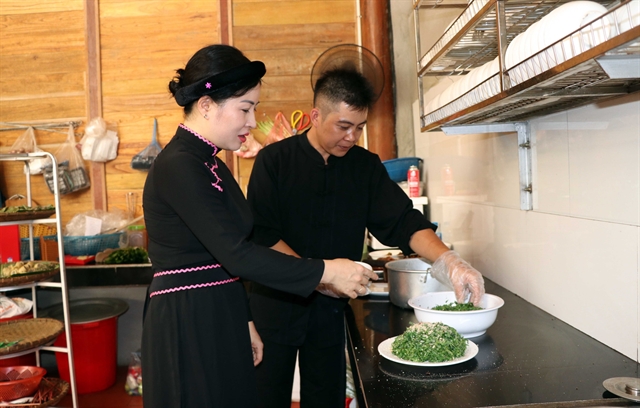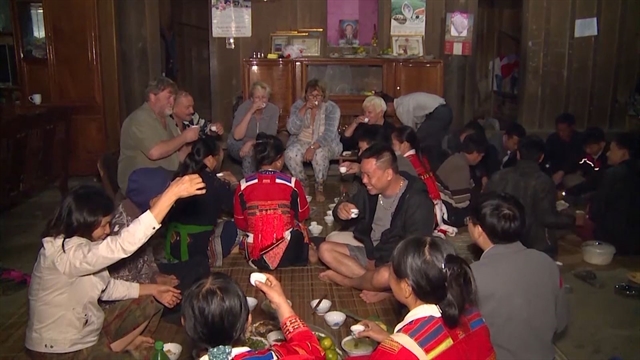
Lâm Bình District in Tuyên Quang Province enchants tourists with its stunning landscape. — Photo lambinh.tuyenquang.gov.vn
By Vũ Quang Đán
Lâm Bình District in the northern province of Tuyên Quang is endowed with abundant national heritage sites and eco-tourism destinations.
To explore the district and local lifestyle, tourists are recommended to experience homestay – a tourism model the district has recently been focusing on to exploit its tourism potential.
A trip to the district begins with a voyage across Tuyên Quang hydroelectric lake by kayak or tour boat.
Covering 8,000 hectares, the lake has been dubbed a Hạ Long Bay on land as its waters are dotted with dozens of islands.
The islands are both rugged and hilly, and the tallest Pắc Tạ is associated with a local legend. Legend has it that villagers used wine to tame elephants and drove them to expel invaders. After the elephants died, they turned into a huge rock that grew over the years and became Pắc Tạ.
The voyage also allows tourists to contemplate the stunning surroundings, the highlights of which include the majestic Cọc Vài Mountain, the enchanting waterfalls and a legendary range of 99 mountains in Thượng Lâm Commune.
After the voyages ends, visitors can choose to stay in one of six local households that offer homestay services.
One of them in Lâm Bình District is A Phủ Homestay managed by Đặng Thị Vân Anh and Hỏa Đức Phủ.

The hosts of A Phủ Homestay prepare meals for visitors. — VNA/VNS Photo Vũ Quang Đán
According to Anh, they have been offering homestay services since April, and have received a lot of positive feedback.
“The tourists stay in a traditional stilt-house which consists of five rooms covering 90sq.m. If they want, they can also taste original dishes or try bathing in medicinal herbs,” she said.
The host of A Phủ Homestay added that she often invited other villagers to perform traditional musical instruments to entertain guests.
The homestay accommodation now provides jobs with an average monthly income of VNĐ5 million (US$216).
Lưu Thị Thoan from Hà Nội is a regular visitor to Lâm Bình District.
“My family travel to the district nearly every year and usually stay at a local homestay.
“There are changes to the land whenever we return. We have enjoyed exciting experiences joining in communal activities to understand the culture of the ethnic people,” she said.
On his first visit to Việt Nam, Spanish tourist Xavi Hernandez chose Lâm Bình District as one of his must-vísit places, in addition to Hạ Long Bay, Sapa and the coastal central city of Đà Nẵng.
“I have travelled to many places around the world and normally stay at a homestay. During my trip to Lâm Bình District, I had a chance to immerse myself in the Tày ethnic culture, try weaving brocade and taste traditional food. What exciting memories,” he recalled.

International tourists enjoy meals with locals at a homestay in Lâm Bình District. — Photo lambinh.tuyenquang.gov.vn
To promote tourism in Lâm Bình District, particularly the model of community-based tourism, local authorities are offering incentives, such as easy access to bank loans.
Besides efforts to restore the traditional cultural values of the ethnic minorities in the area, the district has also encouraged villagers to regularly clean up the streets to improve the environment and created various tours to attract more tourists.
According to Nguyễn Văn Hiền, vice chairman of the People’s Committee of Lâm Bình District, the local administration started the “Constructing and Managing Community-based Tourism” in 2017 which aims to preserve and develop Tày villages in Thượng Lâm, Khuôn Hà and Lăng Can communes.
The district has also opened classes for villagers to learn the experience of community-based tourism from nearby provinces. Training courses to improve services and skills have also been opened.
Furthermore, traditional trades like weaving brocade and cotton planting have been gradually restored to create souvenirs for tourists.
“The tourism development of Lâm Bình District will be closely associated with ethnic identity preservation,” Hiền said.
In 2019, Lâm Bình District targets to welcome over 36,000 tourists, earning revenue of over VNĐ22 billion ($949,000). — VNS
OVietnam